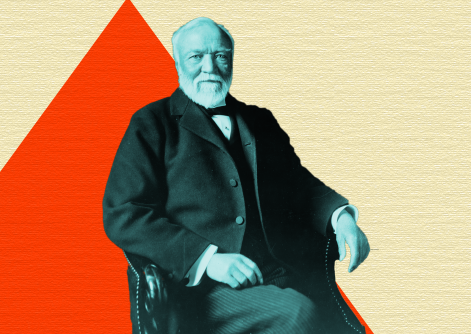Yet that’s what the world’s second- and third-richest men, Bill Gates and Warren Buffett, chose to do when they decided to try to spur charitable giving among the wealthy. They recently announced they have launched an effort to get their fellow American billionaires to pledge to give the majority of their wealth away either during their lives or at their death.
Gates and Buffett have so far held three private dinners with peers to discuss their goal of boosting philanthropy, and at this point four additional families have joined Buffett and the Gates in this pledge: Eli and Edythe Broad, John and Ann Doerr, Marguerite and H.F. “Gerry” Lenfest, and John and Tashia Morgridge. (For some reason, most press coverage overlooks that one of the dinner party guests, Chuck Feeney, has already given away most of his fortune.)
This adds quite a chorus to Alexis de Tocqueville’s rhapsody on the American love of associations. It’s worth quoting a classic passage: “If it is proposed to inculcate some truth or to foster some feeling by the encouragement of a great example, they form a society. Wherever at the head of some new undertaking you see the government in France, or a man of rank in England, in the United States you will be sure to find an association.”
That raises, for me, the most significant point about this undertaking: It is wonderful to see people implicitly declaring the tremendous value of civil society, a value that far outshines the “help” government can provide with money it compels the citizenry to give it. No government could be truly generous in the way that Gates, Buffett, and other American donors are, for several reasons. First, “government,” a hydra-headed creature, isn’t a person who decides to give freely to others. Second, government doesn’t earn its money the way that businesspeople do. Nor does government largesse inspire others to generosity in the way that Gates and Buffett already have. Quite the opposite. As those who read Arthur Brooks – or Al Gore’s tax returns – know, most persons who demand more government giving to the needy don’t bother to give much to anyone. Nor are recipients of government aid more likely to give to others.
How refreshing to see money going directly from private persons to civil society, especially these days when greedy government officials are giving the lascivious eye not only to personal wealth but to foundation endowments and even charitable deductions.
While a few snotty commentators have presumed that the billionaires are motivated only by vainglorious love of publicity or fear of the taxman, it is reassuring that virtually no one has said, “Gee, why don’t they just hand it over to the hemorrhaging U.S. Treasury. The feds need it badly and would use it wisely.”
It’s also impressive that there’s been little said about “giving back.” That phrase, often used innocently enough, implies that persons who succeed in business have “taken” something from others. In fact, to acquire wealth in America – if you’re not, say, a tort lawyer – normally requires people to produce valuable goods and services for which other people happily exchange their money, rather than having it taken from them. Other useful things, like employing people, also come about in the process.
Of course, it would be nice if there had been more mention of the estate tax, which is about to burst back on the scene like a horror movie villain who only appears to die. (The Alliance for Charitable Reform has the latest news on the tax here.) Gates’ father, alas, who co-chairs the Bill and Melinda Gates Foundation, is a champion of the tax.
Which brings us to an obvious point: The Gates family, Mr. Buffett, and their fellow large donors are not plaster saints, nor are their views about politics or charitable causes beyond question. The Gates and Buffett families, for example, have shown bouts of interest in population control, a baleful bit of quackery if ever there were one. Yet so far at least, this crusade for greater giving by the wealthy seems genuinely respectful of donors’ legitimate diversity of views on how and where to give. Gates tells reporters that the donors who spoke at the private dinner parties wowed him with their wide variety of interests, and the new website, GivingPledge.org, declares that no pooling of money is intended.
Perhaps the most obvious fear for observers will be that the vast sums to be given will likely end up in large institutions, which have a strong tendency to sclerosis and rarely achieve the kind of entrepreneurial dexterity that characterize their donors’ business success. Large institutions also tend to end up in the hands of bloodless “experts” – a danger that William Schambra of the Bradley Center for Philanthropy and Civic Renewal eloquently warns against.
On the other hand, Buffett says that the more than 99 percent of his fortune which he’s giving away will be paid out, “at the latest,” ten years after his estate is settled. “Nothing will go to endowments. I want the money spent on current needs.” The Gates Foundation likewise has set a term limit for itself.
That Buffett quotation comes from his impressive letter to GivingPledge.org, explaining his thinking. (Each person or family who takes the pledge is to submit such a letter.) Buffett is both blunt and humble, confessing that he and his family “will give up nothing we need or want” because of the pledge and that his “wealth has come from a combination of living in America, some lucky genes, and compound interest.” He also acknowledges our market system “that sometimes produces distorted results, though overall it serves our country well.” He has “not guilt, but rather gratitude,” and lauds the millions of Americans “who regularly contribute to churches, schools, and other organizations…. The dollars these people drop into a collection plate or give to United Way mean forgone movies, dinners out, or other personal pleasures.”
He is firmly opposed to the materialism common among socialist and atheist critics of America, even as those critics often accuse the wealthy of crude materialism. He insists that possessions can end up “possessing” their owners. More profoundly, he notes humbly that neither in this pledge nor in his life to this point has he much contributed “the most precious asset”: time. Here Buffett echoes Pope Benedict XVI as he declares: “A struggling child, befriended and nurtured by a caring mentor, receives a gift whose value far exceeds what can be bestowed by a check.”
And so let us thank these fellow Americans for acknowledging how our nation’s decency and founding principles are the root causes of our prosperity and happiness. As GivingPledge.org concludes, “We are inspired by the example set by millions of Americans who give generously (and often at great personal sacrifice) to make the world a better place.”





